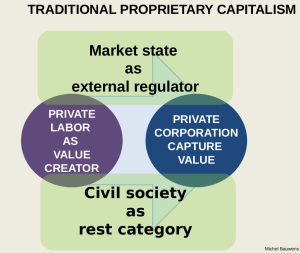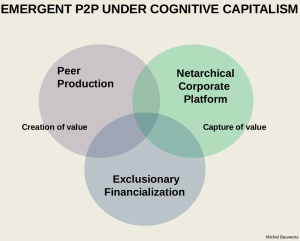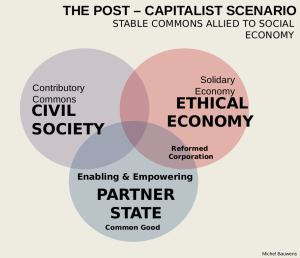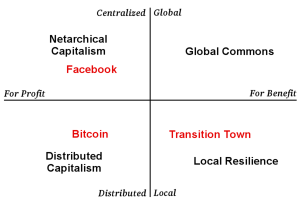
Transitioning to a Commons-Based Society
Background on the FLOK Project
Michel Bauwens:
The National Plan of Ecuador recognizes and stresses that the global transformation towards knowledge-based societies and economies requires a new form for the creation and distribution of value in society. The National Plan's central concept is the achievement of ‘Buen Vivir' (Sumak Kawsay) or ‘good living'; but good living is impossible without the availability of ‘good knowledge', i.e. ‘Buen Conocer' (‘Sumak Yachay'). The third national plan for 2013-2017 explicitly calls for a open-commons based knowledge society[1].
President Correa himself exhorted young people to achieve and fight for this open knowledge society[2].
The FLOK Society is a joint research effort by the Coordinating Ministry of Knowledge and Human Talent, the SENESCYT (Secretaría Nacional de Educación Superior, Ciencia, Tecnología e Innovación) and the IAEN (Instituto de Altos Estudios del Estado) to develop transition and policy proposals to achieve such an open commons-based knowledge society.
FLOK refers to:
- Free, meaning freedom to use, distribute and modify knowledge in universally available common pools;
- Libre stresses that it concerns free as in freedom, not as in ‘gratis';
- Open refers to the ability of all citizens to access, contribute to and use this common resource.
A free, libre and open knowledge society therefore essentially means organizing every sector of society, to the maximum degree possible, into open knowledge commons, i.e. the availability of common pools of knowledge, code and design that are acceptable to all citizens and market entities, to create dynamic and innovative societies and economies, where knowledge is available without discrimination to all who need it to develop their civic and economic activities.
The FLOK project is commissioned by the Secretary of Knowledge Rene Ramirez and SENESCYT, and carried out by the IAEN under the leadership of its rector and Dean of Research, as well as the FLOK Society team leaders Daniel Vazquez and Xabier Barandiaran. Michel Bauwens, the author of the research plan in collaboration with the FLOK Team, is the research director, assisted by five research stream coordinators.
The aim of the research plan is to combine the best advice from the global commons, and Ecuadorian civil society, in order to propose an integrated transition plan and the associated policy framework and proposals.
The research plan builds on the original FLOK Proposal[3], i.e. Designing the FLOK Society, by Xabier E. Barandiaran & Daniel Vázquez. It builds on this proposal and specifically calls for an integrative or ‘wholistic' approach, which goes beyond technology, and calls for measures that take into account different aspects of social change that need to occur if not simultaneously, then at least linked through a positive feedback loop, in which various measures reinforce each other. It also broadens and deepens the call by looking at commons-based infrastructures not just for knowledge, but for other social and productive activities.
The Framing of the Proposal
The Three Value Models and the transition to a Social Knowledge Economy

In order to frame the transition to a ‘social knowledge economy' or a FLOK-based societal model, we use a framing of three particular ‘value extraction and distribution' systems, which determine how economic value is created, extracted, and distributed.
The traditional capitalist value model is of course well known, but the emergence of a knowledge society has already changed these dynamics to a fundamental extent.
In the traditional model, before the era of networked and cognitive production, private capital actors invest in capital and labour, and sell the industrial and consumer products with a surplus value.
But the new models of cognitive capitalism work with different models of value extraction and distribution, and we distinguish three different models, which includes the post-capitalist model of the social knowledge economy. We define cognitive capitalism generically as that model of capitalism where the ownership and control of information flows is the key factor for the extraction of value.
Of the three models we will distinguish, one form is still dominant, but rapidly declining in importance; a second form is reaching dominance, but carries within itself the seeds of its own destruction; a third is emerging, but needs vital new policies in order to become dominant.
The first model: ‘Classic' Cognitive Capitalism based on IP extraction
The first form is the classic form of cognitive capitalism, based on a “rentier” capitalism that extracts rent from Intellectual Property, and in which financial capital dominates. A good description of this form is McKenzie Wark's Hacker Manifesto, in which he describes the logic of “vectoral capitalism”, where the ‘vectors' of communication are in the hands of mass media and the multinational corporations that organize production. This first form of cognitive capitalism was dominant in the first era of networked computing, before the emergence of the civic internet and the web, when the networks were exclusively in the hands of multinational companies and/or governments and their centralized public channels. In this system, the profit of capital is increasingly dependent on ‘intellectual property' regulations that keep technical, scientific, commercial and other forms of knowledge artificially scarce, and therefore allow the realization of super-profits. The profits of purely industrial production have become low, but the benefits of IP and the control of the networks of production through IT, allow for the generation of huge monopolistic profits. This first form of cognitive capitalism is far from dying, is still in fact dominant, but is nevertheless undermined in the second era of networked computing, where internetworks are now diffused throughout society, and the vectors of production can no longer be monopolized. Furthermore, the ubiquity of digital technology, and its ability to reproduce informational products at marginal cost, severely undermines the maintenance of an intellectual property regime based on maintaining artificial scarcity, through legal repression or technological sabotage (DRM).
The second model: Netarchical Capitalism based on the control of networked platforms
Indeed, the second era of massively networked computing, born with the publicly accessible internet, has undermined the control of the “vectoral” class, and created a new class of controllers, that of “netarchical capital”, the type of capital investment that controls proprietary social media platforms, but that nevertheless enables direct peer to peer communication between individuals.

This second form of netarchical capitalism, is a form where capital no longer controls the direct production of information and communication, but extracts value through its new role as platform intermediary. This model relies much more marginally on IP protection, but rather allows p2p communication but controls its possible monetization through the role and the ownership of the platforms for such communication. Typically, as in proprietary social media such as Facebook or Google, the front end is peer to peer, i.e. it allows p2p sociality, but the back end is controlled, the design is in the hands of the owners, as are the private data of the users, and it is the attention of the user base that is marketed through advertising. The financialisation of cooperation is still the name of the game. This form is a hybrid form however, because it also allows the further growth of p2p sociality in which media exchange and production is largely available to an ever large user base.
This form thus co-exists with multiple forms of grassroots p2p production and exchange, and sees for example the emergence of more monetary diversity, in the form of more localized complementary or community-driven currencies which act as, and of a global reserve crypto-currency like Bitcoin, a shadow currency that is useful as a ‘civic' post-Westphalian currency but at the same time exhibits the features of financial capitalism in an exacerbated fashion. Netarchical capitalism suffers from a severe ‘value crisis', in which the logic of use value strongly emerges and grows exponentially, but in a demonetized form. The remaining monetized value rests on speculative valuation of cooperative value creation by financial markets.
The Value Crisis under conditions of netarchical capitalism
Neoliberalism was characterized by a particular ‘value crisis' which exploded in the systemic crisis of 2008. Under the general conditions of the neoliberal regime, the wages of the workers have stagnated, and the part that goes to the owners of capital increased, creating a crisis of accumulation, which was solved through credit. When corporations, governments and the general consumer's credit became over-extended, by 2008, the neoliberal system entered into a systemic crisis. Already under neoliberalism, the material value of the assets of production, are but a small part of the evaluation of a company's value, and the excess value can be considered already as a form of extraction of the human immaterial cooperation. Under conditions of cognitive capitalism, especially under its netarchical form, this value crisis is exacerbated.
The period since the 1990s, when civic internetworks became increasingly available to the wider population, and commons-based peer production, and other forms of networked value creation became possible, saw the birth of a mixed regime.
Through the different forms of peer production and networked value creation, use value is increasingly created independently of the private industrial and financial system, and takes place through the civic contributory form, where immaterial use value is deposited in common pools of knowledge, code and design.
In ‘pure' peer production, which we can call a form of ‘aggregated distribution’ of labor, contributors, voluntary or paid, contribute to a common pool where the immaterial value is deposited; for-benefit associations, such as the FLOSS Foundations, enable the continued cooperation to occur; and entrepreneurial coalitions of mostly for-profit capitalist enterprise, capture the added value in the marketplace. In this model, though there is continued creation of use value in the commons, and thus, ‘an accumulation of the commons' based on open input, participatory processes of production, and commons-oriented output which is available to all users; capital accumulation continues through the form of labour and capital in the entrepreneurial coalitions. But an increasing amount of voluntary labour is extracted in this process. In the sharing form of networked value, characterized by social media/networking taking place over proprietary platforms, the use value is created by the social media users, but their attention is what creates a marketplace where that use value becomes extracted exchange value. In the realm of exchange value, this new form of ‘netarchical capitalism' (the hierarchies of the network) may be interpreted as hyper-exploitation, since the use value creators go totally unrewarded in terms of exchange value, which is solely realized by the proprietary platforms. Finally, in the form of crowdsourced marketplaces, what we call ‘disaggregated distribution’ because the workers are isolated freelancers competing without collective shared IP, capital abandons the labour form and externalizes risk on the freelancers. According to preliminary research by ‘digital labor' researcher Trebor Scholz, communicated orally, the average hourly income does not exceed 2 dollars, which is way below the U.S. Minimum wage. A typical example is the skills marketplace TaskRabbitt, where the workers cannot communicate with each other, but clients can.
Under the regime of cognitive capitalism, use value creation expands exponentially, but exchange value only rises linearly, and is nearly exclusively realized by capital, giving rise to forms of hyper-exploitation. We would argue that it creates a form of hyper-neoliberalism. While in classic neoliberalism, labour income stagnates, in hyper-neoliberalism, society is deproletarized, i.e. waged labor is increasing replaced by isolated and mostly precarious freelancers ; more use value escapes the labour form altogether.
Under the mixed regime of cognitive capitalism in its netarchical form , networked value production grows, and has many emancipatory effects in the social field of use value creation, but this is in contradiction with the field of exchange value realization, where hyper-exploitation occurs. This is what we mean when we say that there is an increased contradiction between the proto-mode of production that is peer production, and associated forms of networked value creation; and the relations of production, which remain under the domination of financial capital.
In this new hybrid form, a sector of capital, netarchical capitalism, has liberated itself to some significant degree of the need for proprietary forms of knowledge, but it has actually increased the level of surplus value extraction. At the same time, use value escapes more and more its dependency on capital. This form of hyper-neoliberalism creates a crisis of value. First, the part of exchange-value mediated labor, diminishes compared to the role of direct use value creation, making capital increasingly superfluous and parasitical; second, the forms of value creation explode, but the continued reliance on monetized exchange value does not allow for the realization of that value by the use value producers; profits in the industrial economy, diminish as well, making the financial sector and its reliance on IP rent, the increasingly dominant power; at the same time, the power of IP rent extraction is undermined by direct use value creation. In any case, all these trends create a crisis for the accumulation of capital; the feedback loop between use value creation, and the exchange-value capture, ideally redistributed either as wages or through social payments, is broken; over-reliance on debt renders massive lending moot as a solution. Capital becomes more reliant on the externalities of social cooperation, yet fails to reward it. Financial capitalism realizes the value of social cooperation through speculative mechanisms which increase the amount of fictitious capital in the system (the fictitious capital is actually the unrealized use value that is no longer rewarded because of the value crisis). These correlated issues are examined in depth by Adam Arvidsson and Nicolai Peitersen in their book on the Ethical Economy.
We could call this value regime neo-feudal, because it relies increasingly on unpaid ‘corvee' and creates widespread debt peonage. Finally, ownership is replaced by access, diminishing the sovereignty that comes with property, and creating dependencies through the one-sided licensing agreements in the digital sphere.
Towards a third model: a mature ‘civic' peer-to-peer economy

The third is the hypothetical form we believe we may successfully transition to, if we succeed in rebuilding transformative social movements, and hence succeed also in transforming the state so that it can act as a Partner State which facilitates the creation of new civic infrastructures. In this model, peer production is matched to both a new market and state model, create a mature civic and peer-based economic, social and political model, where the value is redistributed to the value creators. These changes have been carried forward in the political sphere by a emerging commons movement, which espouses the value system of peer production and the commons, driven by the knowledge workers and their allies.
Solving the value crisis through a social knowledge economy
Since the mixed model seems to create untenable contradictions, it becomes necessary to imagine a transition to a model where the relations of production are not in contradiction with the evolution of the mode of production. This means a system of political economy which would be based on the recognition, and rewarding, of the contributive logic at work in commons-oriented peer production.
If we look at the micro-level, we recommend the intermediation of cooperative accumulation. In today's free software economy, open licences enable the logic of the commons, or even technically, ‘communism' (each contributes what he/she can, each uses what is needed), but created a paradox: ‘the more communistic the license, the more capitalistic the economy', since it specifically allows large for-profit enterprises to realize the value of the commons in the sphere of capital accumulation. Hence, ironically, the growth of a ‘communism of capital'.
We propose to replace the non-reciprocal ‘communistic' licenses, with socialist licenses, i.e. based on the requirement of reciprocity. Hence, the use of a peer production license, would require a contribution to the commons for its free use, at least from for-profit companies, to create a stream of exchange value to the commoners/ peer producers themselves; in addition, commoners would create their own market entities, create added market value on top of the commons, realize the surplus value themselves, and create a ethical economy around the commons, where the value of the production of rival goods would be realized. Such ethical entrepreneurial coalitions would likely enable open book accounting and open supply chains, that would coordinate the economy outside of the sphere of both planning and the market. The ethical entrepreneurial coalitions could expand the sphere of the commons by the use of commons ventures, such as in the ‘venture communist' model proposed by Dmytri Kleiner. In this model, cooperatives in need of capital would float a bond that would allow the purchase of means of production. These means of production would belong to the commons; in other words, the machines would be rented from the common pool, but this rent would also be redistributed to all the members of the commons. In this binary economic form, the commoners-cooperators would receive both a wage from their cooperative, but also an increasing part of the common rent. (In addition, all citizens would benefit from a basic income provided by the Partner State). Such entrepreneurial coalitions, intrinsically in solidarity with their commons, could also move to practices such as open accounting and open logistics, which would allow for widespread mutual coordination of their productive capacities, hence ushering a new third model of allocation that would be neither a market, nor a planning system, but a stigmergic coordination system. In other words, the stigmergic coordination already operating in the sphere of ‘immaterial' production, would gradually be transferred to the sphere of ‘material' production. To the degree that such stigmergic systems create the possibility of resource-based economic models, such spheres of the economy would be gradually demonetized and replaced by measurement systems (i.e. commodity currencies with ‘store of value' systems would gradually disappear).
However, such changes at the level of the micro-economy would not survive a hostile capitalist market and state without necessary changes at the macro-economic level; hence the need for transition proposals, carried by a resurgent social movement that embraces the new value creation through the commons, and becomes the popular and political expression of the emerging social class of peer producers and commoners – allied with the forces representing both waged and cooperative labor, independent commons-friendly enterpreneurs, and agricultural and service workers.
Four Technology Regimes
Value regimes are more or less associated with technology regimes, since the forces at play want to protect their interests through the control of technological and media platforms, which encourage certain behaviours and logics, but discourage others. The powers over technological protocals and value-driven design decisions are used to create technological platforms that match proprietary interests.
Thus, even as peer to peer technologies and networks are becoming ubiquitous, ostensibly similar p2p technologies have very different characteristics which lead to different models of value creation and distribution, and thus different social and technological behaviours. In networks, human behaviour can be subtly or not so subtly influenced by design decisions and invisible protocols that are designed in the interest of the owners or managers of the platforms.
The following graphic is organized around two axes, which determine at least four distinct possibilities.

The first top-down axis distinguishes centralized technological control (and a orientation towards globality) from distributed technological control (and a orientation towards localization); the horizontal axis distinguishes a for-profit orientation (where any social good is subsumed to the goal of shareholder profit), from for-benefit orientations (where eventual profits are subsumed to the social goal).
– – – – – – –
* In conclusion:
In short, we need a alliance of the commons to project civil and political power and influence at every level of society; we need phyles to strengthen our economic autonomy from the profit-maximizing dominant system; and we need Chambre of the Commons to achieve territorial policy; legal and infrastructural conditions for the alternative, human and nature-friendly political economy to thrive. Neither alone is sufficient, but together they could be a powerful triad for the necessary phase transition.
Read full article as it is updated beyond this revision (2).
COMPLETE TABLE OF CONTENTS
- 2 Background on the FLOK Project
- 3 The Framing of the Proposal
- 3.1 The Three Value Models and the transition to a Social Knowledge Economy
- 3.2 Four Technology Regimes
- 3.2.1 Netarchical Capitalism as a technological regime: peer to peer front end, hierarchical back-end
- 3.2.2 Distributed Capitalism as a technological regime: the commodification of everything
- 3.2.3 Resilience Community Platforms Designed for Re-Localization
- 3.2.4 The Global Commons Scenario as the desired alternative
- 3.3 Cognitive/Netarchical Capitalism vs. an Open-Commons based Knowledge Society
- 3.4 Introducing the new configuration between State, Civil Society and the Market
- 3.5 A description of the new triarchy of the Partner State, the Ethical Economy and a Commons-based Civil Society
- 3.6 Beyond the market, beyond planning ?
- 3.7 The historical and present importance of mutualization in times of increasing resource scarcity
- 3.8 A historical opportunity: The Convergence of Material/Technical P2P Infrastructures, Digital/Immaterial Commons, and Commons-Oriented Governance and Ownership Models
- 3.9 Elements of Idealized and Integrative Full Transition Plan to a mature Social Knowledge Economy
- 3.10 Political reconstruction of social movements in a conjuncture of post-industrial transformation
See Also:



